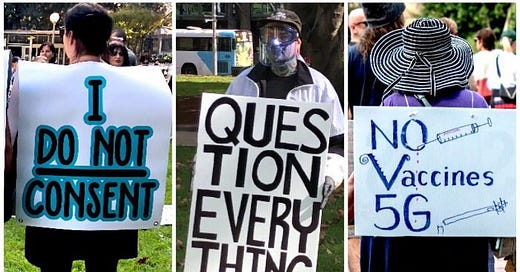The art of discussing vaccinations
Jonathan Berman wants us to approach anti-vaxxers differently
As two COVID-19 vaccines roll out in America, Pew Research reported a rare glimmer of hope in the ongoing saga of vaccine disinformation: the number of citizens willing to get a vaccine increased to 60 percent. The trend is moving in the right direction, course-correcting anti-vaccination rhetoric that led to the first increase in measles cases (and the highest number of measles deaths) in the modern era.
While we have fabricated research by disbarred doctor Andrew Wakefield to thank for this trend, anti-vaccination efforts are tethered to the first vaccinations. As with seemingly every topic, vaccines are a wedge issue, with a fervent cohort of anti-vaxxers going so far as to be "single-issue voters."
Jonathan Berman, an assistant professor in the Department of Basic Sciences at NYITCOM-Arkansas, grew tired of seeing all of the "dunking on anti-vaxxers." As with many science advocates, he grew skeptical of the anti-vaxx movement while studying for his degree in the aughts. Though he agreed with Richard Dawkins and Christopher Hitchens, he recognized them as bullies. Berman wanted to grapple with the underlying reasons for opposing vaccination rather than just write them off.
Those reasons, which comprise a chapter of his recent book, Anti-vaxxers: How to Challenge a Misinformed Movement (MIT Press), include issues of social class, race, individual liberties, individual and collective rights, distrust of authority, and changing ideas about health and medicine. Instead of exhibiting knee-jerk reactions, he wants to offer compassion and empathy while expressing critical thinking when analyzing the science of vaccines. As Berman recently explained of anti-vaxxers,
"They're making a risk evaluation just like we're making a risk evaluation. They're doing it in a less reasonable and healthy way and arriving at the wrong decision. That doesn't mean that we have to call them stupid or act like they're foolish. It means we can have a conversation with them. Hopefully, that's a more productive way to go about it."
As he wrote the book before the pandemic hit, Berman is a bit dismayed (though not surprised) by the growth of the anti-vaccine movement. He noticed a convergence point this year: anti-mask and anti-lockdown proponents (as well as QAnon devotees) learned a set of tactics from the longstanding anti-vax movement, while anti-vaxxers took the energy of "personal liberty" and "bodily sovereignty" being expressed by those groups.
There have been a number of anti-vax leaders whose star has risen this year: Mikki Willis has surged since the release of his Plandemic film; Del Bigtree, whose show "The Highwire" is in large part funded by hedge fund managers, is growing more influential; and gynecologist Christiane Northrup, who has used her social media platforms to promote QAnon-related and anti-vax sentiments, is also seeing a rise in followers. As Berman writes, celebrities are not the best sources of information, and their intentions might not be as benevolent as they seem.
"There's a degree of grift in what they're doing. They're collecting donations from their audience of anti-vaccine people they've built up."
Science sometimes suffers from lack of celebrity. Paul Offit will never be Neil Degrasse Tyson or Bill Nye. While a select few science educators break through, vaccination advocates are unlikely to achieve that level of star power. Berman, one of the founders of the "March for Science" movement—a rare mainstream moment of science advocacy in the Trump era—knows the difficulty of spreading the gospel of sound scientific methods.
Navigating the tricky terrain of vaccines is difficult. Thankfully, Berman's excellent book offers hope. Twenty-two concise chapters pack a lot of punch: the history of both vaccines and the anti-vax movement; dangerous ploys by grifters; the science of vaccines; and a chapter on vaccine ingredients, like adjuvants.
Consider supporting this newsletter by subscribing to the weekly Monday edition.
While Berman is pro-vaccine, he believes Pfizer and Moderna deserve scrutiny. Commentary from outside organizations and researchers should be offered. That said, while pharmaceutical companies certainly have a track record of corporate greed, vaccines only account for 2 percent of profits—hardly cash cows like painkillers and antidepressants.
Berman laughs off the occasional criticism that he's a paid shill. "I'm still on the negative on the book—just because of caffeine purchases while I was writing it."
Disinformation abounds in the modern era. Posts about the dangers of thimerasol and aluminum persist even though neither are in the Pfizer vaccine. Berman advocates for pushing back against misinformation with better data.
"The coronavirus vaccine—these are very simple formulations. There's salt, RNA, and a lipid to help the RNA cross cell membranes. If someone says there's aluminum in that, you can say, 'not in this one.' And if someone says there's mercury in that, you can say, 'not in this one.'"
He knows the challenges that lie ahead. Still, as Pew shows, more Americans understand the role that vaccines play in reaching a post-pandemic world. Berman concludes our talk on what you might say is a hopeful note.
"We're not going to get everyone on board. We just need to get enough people on board."





